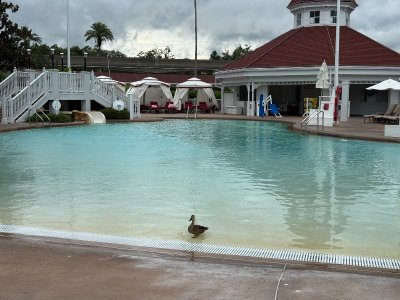Oh I know, but I have some irrational fears lol. I haven't swam in a river yet (I'm in the NE by the ocean) and had reservations prior to this. I know it's extremely rare and irrational but I always worry about amoebas and bacteria in lakes and rivers. Now I can add human and duck poo


I know it's nuts and I love seeing fish in the ocean but the minute one bites me I'm out

as for public pools, I will be smelling it for coloring before I even think of going in. If you think that's crazy enough, don't start me on ticks!
Omg. You guys are trying to kill me! I never heard that term used medically before and let's just say I wish I didn't follow this thread

the good news is that it's not common to get it from pools (from Google and I'm sticking to it).
I'm headed to Universal next week and on our pool afternoons this thread will be all I think about lol.
 They maintenance their pool, like Disney would.
They maintenance their pool, like Disney would.


